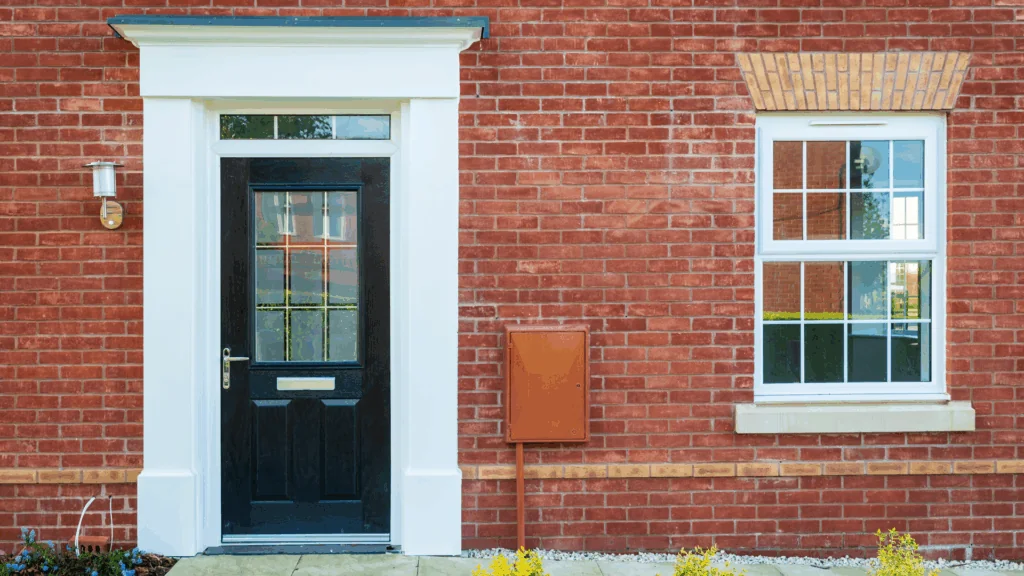- Are Skipton Building Society Strict?
- How Long Does Skipton Typically Take to Process Mortgage Applications?
- What Should You Do If Skipton Declines Your Mortgage?
- Can You Challenge Skipton’s Mortgage Refusal?
- Why Might Skipton Decline Your Mortgage Application?
- How Soon Can I Reapply for a Mortgage After Refusal
- The Bottom Line
What Should I Do If Skipton Refused My Mortgage?

Having your mortgage application turned down can feel quite upsetting, especially in the UK’s competitive housing market.
If Skipton has said no to your mortgage and you’re left wondering what to do next, this article is here to help.
We’ll explain why Skipton might have refused your application and guide you on steps to take for a better chance next time.
While this article is a good start, getting advice that fits your situation is always best. Personal advice can save you time and reduce stress, leading you to a successful mortgage application sooner.
Are Skipton Building Society Strict?
Skipton Building Society’s mortgage lending criteria are quite comparable to other major UK lenders. They focus on essential factors such as your credit history, income, and the type of property you’re looking to buy.
If you’re applying for a mortgage with them, it’s important to have a clear credit record and a stable income. They do show flexibility for minor credit issues but can be strict with significant debts or complex property types.
Skipton’s goal is to manage risk effectively while providing fair lending opportunities, ensuring responsible decisions are made in the mortgage process.
How Long Does Skipton Typically Take to Process Mortgage Applications?
Typically, Skipton Building Society processes mortgage applications within two to four weeks. The exact time can vary based on the details of your application.
For example, if your financial situation is straightforward and your documentation is in order, the process might be quicker. However, if there are complexities such as credit issues or self-employment, it might take longer.
Skipton needs to ensure all aspects of your application meet their criteria, so having your financial records well-organised can help speed up the process
What Should You Do If Skipton Declines Your Mortgage?
When Skipton Building Society declines your mortgage, it’s a signal to reassess your application.
Here are the steps you can take:
Don’t Immediately Reapply
It’s important not to rush into applying with another lender right away. Frequent applications can negatively impact your credit score, as each one leaves a mark on your credit history.
Multiple applications in a short time can be a red flag for lenders.
Find Out the Reasons for Refusal
Knowing why Skipton declined your mortgage is crucial. Investigate whether it was due to your credit score, your income, or something about the property you’re interested in.
Understanding these reasons is key to fixing any issues.
Seek Guidance from a Mortgage Advisor
Getting advice from a mortgage advisor can be helpful. They can look into why Skipton turned you down and advise on what you should do next.
This might mean improving your credit rating, saving up a larger deposit, or sorting out any property issues.
Plan Your Next Steps
With your mortgage advisor’s advice and a clear idea of why you were refused, you can start making plans to improve your chances.
This might involve improving your financial situation or looking at different properties that lenders might view more favourably.
Explore Alternative Options
Different lenders have different rules. If Skipton’s criteria don’t suit your situation, your mortgage advisor can help you find other lenders who might be more appropriate.
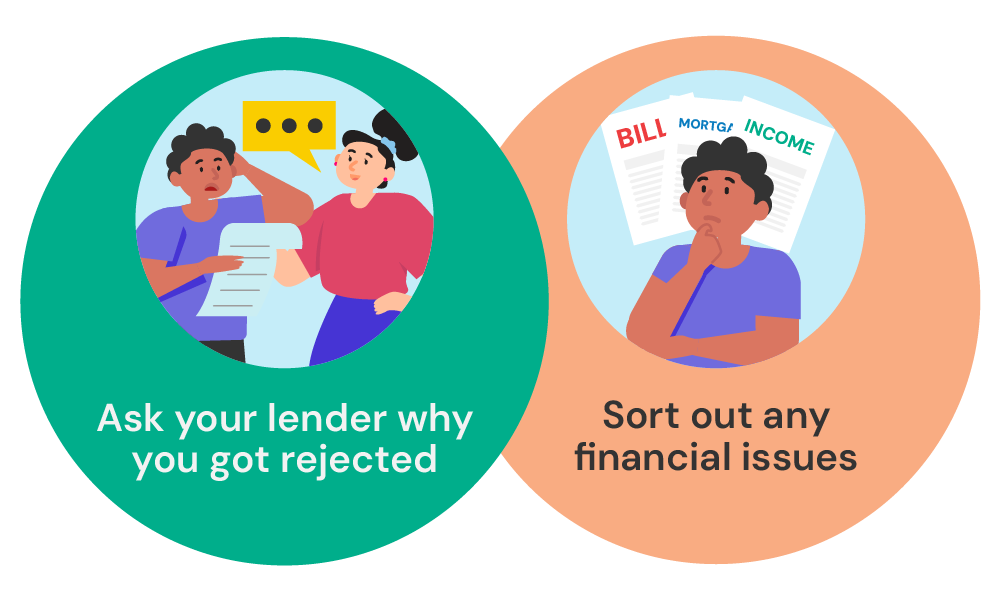
Can You Challenge Skipton’s Mortgage Refusal?
Yes, you can challenge a mortgage refusal from Skipton Building Society. If you believe there’s been an oversight or your circumstances have improved since your application, you can request a review.
Here’s how:
- Understanding the Appeal Process. Check Skipton’s website or contact their customer service to find out how to lodge an appeal. They should provide clear instructions and what information you need to provide.
- Preparing for the Appeal. Ensure you have all relevant documentation ready, such as evidence of improved financial stability or corrected credit reports. It’s important to present the reasons why you believe the initial decision should be reconsidered.
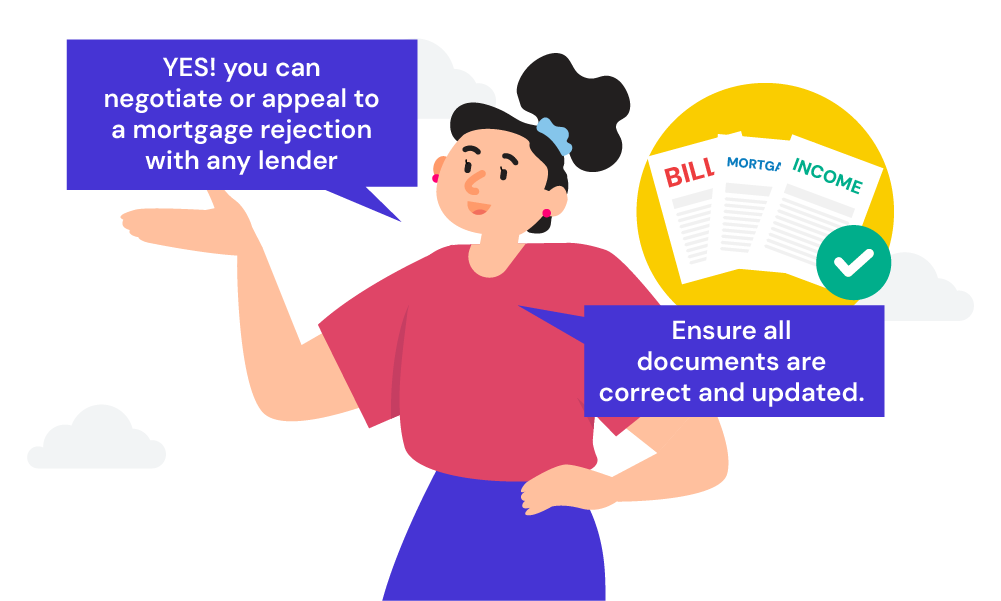
Why Might Skipton Decline Your Mortgage Application?
Skipton Building Society may decline your mortgage application for several specific reasons:
Property Survey Issues
If Skipton’s survey of the property you want to buy uncovers issues, this could be a reason for refusal.
Problems such as Grade 1 listed status, being on contaminated land, or being made with non-standard materials like Wollaway or completely timbered structures can be red flags.
These types of properties are often seen as high risk due to potential difficulties in selling or insuring them.
Credit Report Concerns
Your credit report plays a crucial role in Skipton’s decision. If they find recent defaults (especially within the last 3-12 months), evidence of payday loan usage, or ongoing debt management plans, these can lead to a refusal.
Skipton does offer mortgages to those with some bad credit history, but there are limits to the level of risk they are willing to accept.
Income and Affordability
Skipton assesses if your income is sufficient to cover the mortgage. They generally lend up to 4.75 times your annual income.
If the mortgage amount you require exceeds this income multiplier, Skipton might view the loan as unaffordable for you and decline the application.
Geographical Limitations
Skipton has specific geographic lending boundaries.
They typically do not offer mortgages for properties located in Northern Ireland, the Channel Islands, the Isle of Man, or other regions outside England, Scotland, and Wales. These areas do not fall within their standard lending criteria.
Recent Return from Abroad
If you’ve recently returned to the UK after living abroad, Skipton might not be the right lender for you.
They usually require a longer period of UK residency before considering a mortgage application, even if you’ve secured employment in the UK.
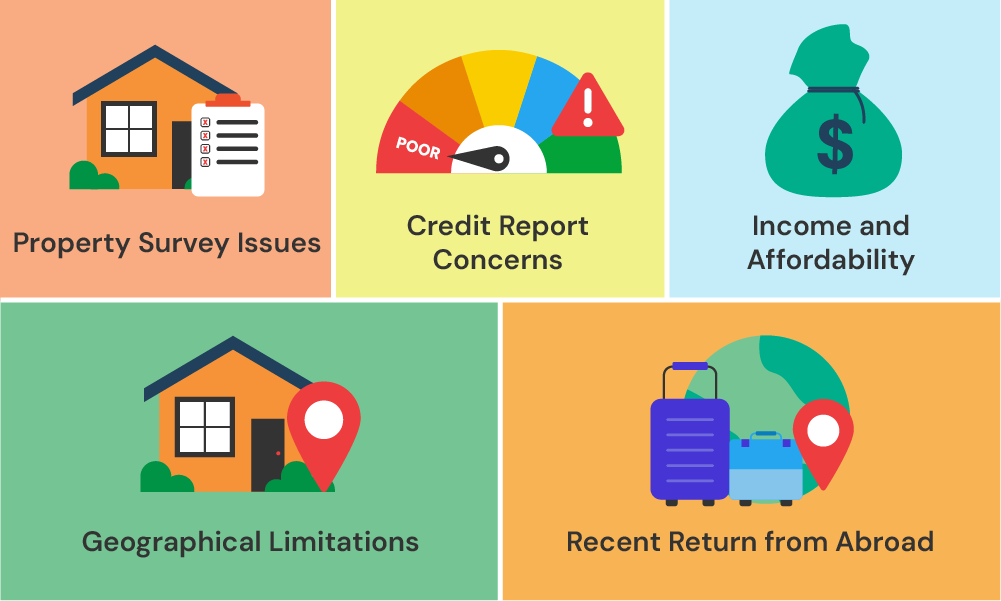
How Soon Can I Reapply for a Mortgage After Refusal
After Skipton Building Society declines your mortgage application, a waiting period of around six months or more is generally advisable.
This gives you time to improve aspects of your application that may have led to the refusal.
Here’s what you can focus on:
Work on enhancing your credit score by consistently paying off debts and keeping up with bill payments. It’s also wise to avoid new loans and check your credit report for any errors.
Stabilising Your Employment
If you’ve recently started a new job or are in a probationary period, staying in your role shows lenders that your income is stable, which is a key factor in securing a mortgage.
Saving for a Larger Deposit
The more you save for a deposit, the lower the risk for the lender, and the better your chances of getting approved. Plus, a larger deposit often means better mortgage rates.
Reducing Unnecessary Spending
Lowering your non-essential expenses can improve your financial profile. It shows lenders that you are capable of managing your finances responsibly.
Addressing Property-Related Issues
If the refusal was related to the property, either look for a different property with fewer issues or resolve the existing ones. Properties without significant problems are more likely to be approved.
Organising Financial Documentation
Make sure all your financial documents, like bank statements and payslips, are in order. This helps to streamline the application process when you reapply.
Seeking Advice from a Mortgage Broker
A mortgage broker can give you personalised advice on when and how to reapply. They understand the mortgage market and can guide you to lenders who may be more likely to accept your application.
By focusing on these areas, you’re not just waiting to reapply; you’re actively improving your situation to make your next mortgage application stronger.
Remember, being declined once doesn’t end your journey to homeownership; it’s an opportunity to return with a more robust application.
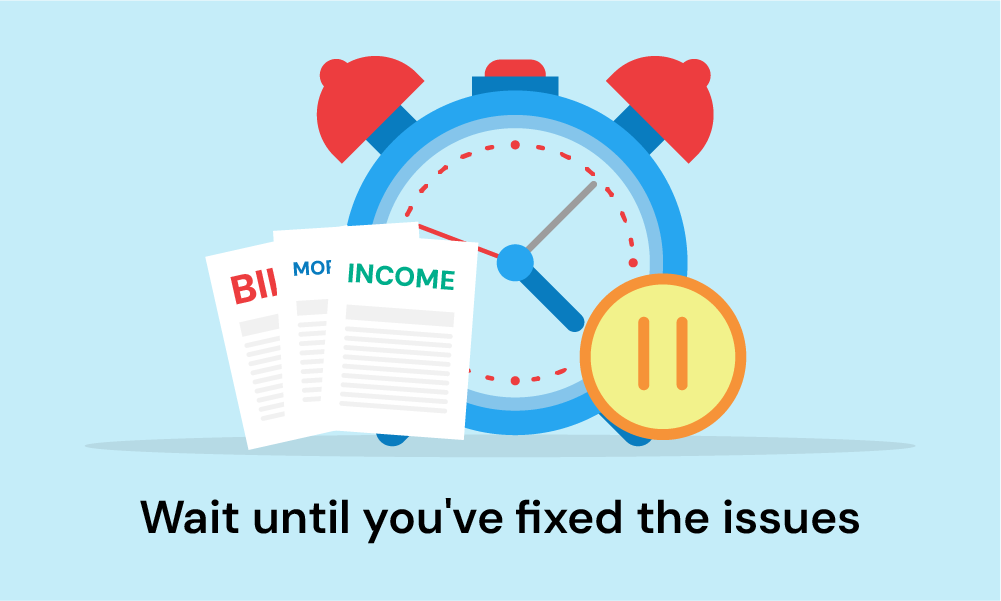
The Bottom Line
Being declined for a mortgage can be tough, but it doesn’t mean you should give up on buying a home.
It’s a chance to look at your application and see how you can make it better. First, find out why they refuse your application. This could be related to your credit history, income, or the property itself.
You can use this knowledge to make good changes, like working on your credit score or saving more money for a deposit.
Remember, different lenders have different criteria. What might not fit Skipton’s policies could be acceptable to another lender. Therefore, it’s crucial not to lose hope and to explore all available options.
An expert’s guidance can be invaluable in such situations. Good mortgage brokers can give you advice that fits your situation. They can help you understand different mortgages and find a lender that’s right for you. This can make things less stressful and save you time.
If you’re feeling overwhelmed by the process and looking for expert guidance, don’t hesitate to reach out. We can connect you with an FCA-qualified broker who specialises in cases like yours.
Get Matched With Your Dream Mortgage Advisor...

Frequently Asked Questions
What is the minimum deposit required for a Skipton mortgage?
You usually need a minimum deposit of 10-15% of the property’s value for a Skipton mortgage. However, this can vary based on your circumstances and the type of mortgage. Skipton periodically offers products for lower deposits, so it’s worth checking their latest requirements.
Can I get a Skipton mortgage if I'm self-employed?
Yes, Skipton offers mortgages to self-employed individuals. You’ll typically need to show at least two years of stable income, backed by accounts or tax returns. The better your financial records, the stronger your application will be.
Are Skipton mortgages portable?
Yes, Skipton mortgages are generally portable. This means you can transfer your mortgage to a new property if you move. However, the transfer is subject to approval, and you must meet Skipton’s lending criteria for the new property.
What does 'referral' status mean in the Skipton mortgage process?
‘Referral’ status in your Skipton mortgage application means it requires further review by their underwriting team.
It’s not an outright refusal but indicates they need more information or need to assess certain aspects more closely. It’s a standard part of the process, especially for applications with unique circumstances.
Does Skipton consider gifted deposits?
Skipton accepts gifted deposits, mainly if they come from close family members like parents or grandparents. The person gifting the deposit may need to provide a written statement confirming the gift is non-repayable.

